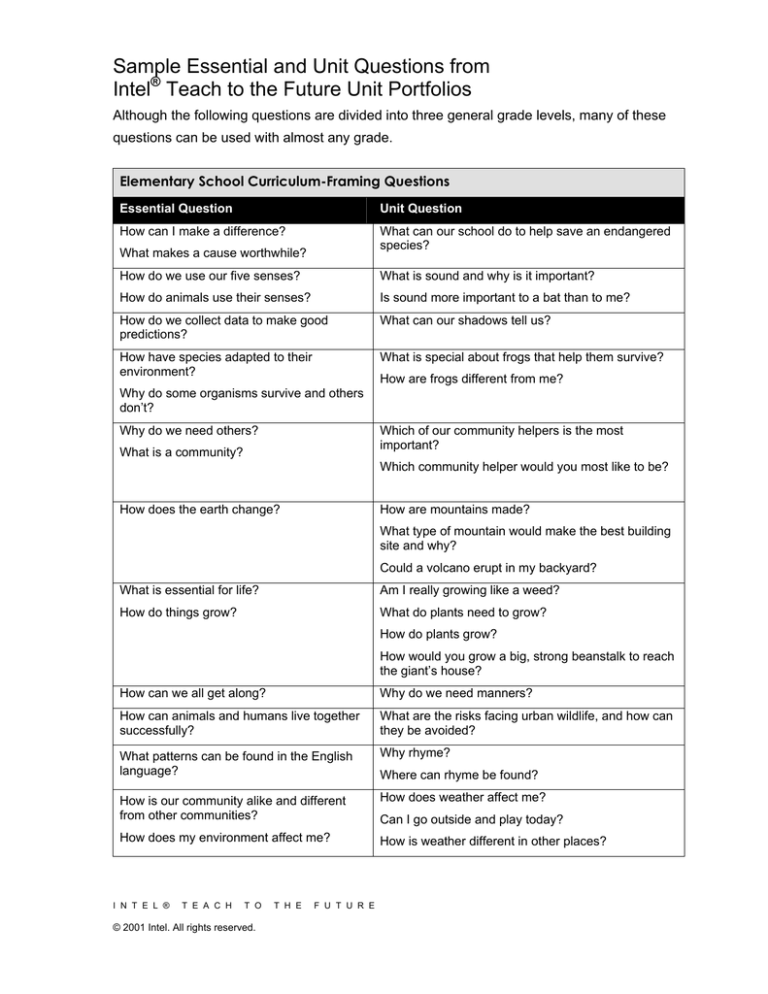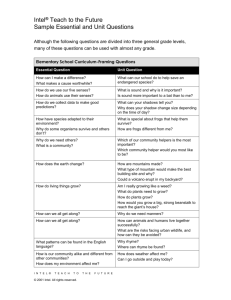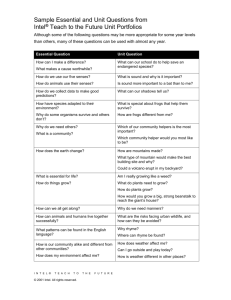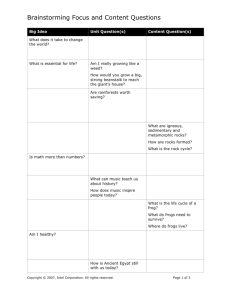
Sample Essential and Unit Questions from
Intel® Teach to the Future Unit Portfolios
Although the following questions are divided into three general grade levels, many of these
questions can be used with almost any grade.
Elementary School Curriculum-Framing Questions
Essential Question
Unit Question
How can I make a difference?
What can our school do to help save an endangered
species?
What makes a cause worthwhile?
How do we use our five senses?
What is sound and why is it important?
How do animals use their senses?
Is sound more important to a bat than to me?
How do we collect data to make good
predictions?
What can our shadows tell us?
How have species adapted to their
environment?
What is special about frogs that help them survive?
How are frogs different from me?
Why do some organisms survive and others
don’t?
Why do we need others?
Which of our community helpers is the most
important?
What is a community?
Which community helper would you most like to be?
How does the earth change?
How are mountains made?
What type of mountain would make the best building
site and why?
Could a volcano erupt in my backyard?
What is essential for life?
Am I really growing like a weed?
How do things grow?
What do plants need to grow?
How do plants grow?
How would you grow a big, strong beanstalk to reach
the giant’s house?
How can we all get along?
Why do we need manners?
How can animals and humans live together
successfully?
What are the risks facing urban wildlife, and how can
they be avoided?
What patterns can be found in the English
language?
Why rhyme?
How is our community alike and different
from other communities?
How does weather affect me?
How does my environment affect me?
How is weather different in other places?
I N T E L ®
T E A C H
T O
© 2001 Intel. All rights reserved.
T H E
F U T U R E
Where can rhyme be found?
Can I go outside and play today?
Middle School Curriculum-Framing Questions
Essential Question
Unit Question
What does it take to change the world?
What impact did early explorers have on the
development of America and their home country?
How did early explorers change the world?
What is an ecosystem and why should I
care?
Why protect the environment?
Are rainforests worth saving?
How do people and animals live in rainforests and
how can they best co-exist?
How can we all get along?
Where does energy come from?
How can we use natural resources to create energy?
Why is water important?
Are the world’s ponds healthy?
What makes a healthy pond?
Am I healthy?
What can I do to reduce health risks?
How do the systems of the body work together to
keep me healthy?
Why are people always on the move?
Where’s the best place to live?
Why do immigrants give up everything to go to a
strange country?
What are the building blocks of life?
What is special about a cell?
What makes something “alive”?
What can cells tell us about the organization of other
systems?
How does the past affect the future?
How is Ancient Egypt still with us today?
How does environment affect behavior?
How would you be different if you lived somewhere
else?
How can one live beyond one’s time?
Which of Leonardo Da Vinci’s areas of expertise had
the most impact on today?
How was Leonardo Da Vinci an inspiration for the
future?
How do systems of government affect the
individual?
What impact did the Feudal System have on a
person’s overall quality of life during the Middle
Ages?
What Feudal character would you have liked to have
been during the Middle Ages?
How does conflict produce change?
What were the causes and results of the ______
war?
How is our life different today because of this
conflict?
Where do stories come from?
How much does Greek and Roman mythology
influence literature and our everyday life?
What makes a community?
How does community history affect today’s
community values?
I N T E L ®
T E A C H
T O
© 2001 Intel. All rights reserved.
T H E
F U T U R E
High School Curriculum-Framing Questions
Essential Question
Unit Question
What can we learn from music?
What does the music of today tell about us?
How does a composer’s life influence his/her music?
What does the music from the 60’s say about its time
period and culture?
What does it take to change the world?
How did the policies or actions of Abraham Lincoln
affect America in the 1860’s?
How do the policies and actions of Abraham Lincoln
affect your life today?
How can we respond to human suffering in
ways that promote dignity?*
Does society have a responsibility to treat diseases?
What are our individual roles in their prevention,
containment, and treatment?*
How can I use logic to find new properties
and relationships?
How can geometry help me understand the world
around me?
Am I my brother’s keeper?
What can we do to help those in need?
Can famine be prevented?
How can I get what I want?
What’s the best car?
How do loans work?
Can one person make a difference?
How have individuals impacted history?
What makes someone important?
Who is the greatest American president?
How can we harness the earth’s power?
What is electricity?
Where else can we get electricity?
Why is the universe the way it is?
What’s the physics behind the stars?
What can we learn about ourselves by studying the
galaxy?
Who decides for us?
What forms public opinion?
Do we really have a choice?
How can statistics lie?
Where do stories come from?
How much does history influence literature?
How can we predict the future?
Based on current statistics, what will the future be
like?
What can numbers tell us?
How does art imitate life?
Is a picture worth a thousand words?
What stories do photographs tell?
Whose story does a photograph tell?
Why do laws change?
Are 200-year old laws still relevant today?
When should laws change?
What laws, national or local, may be challenged
sometime in the future?
I N T E L ®
T E A C H
T O
© 2001 Intel. All rights reserved.
T H E
F U T U R E
How does conflict produce change?
In Lord of the Flies, how do the characters respond
to conflict? Why do humans often react to conflict
with violence?
How does art reflect or change culture?
How does impressionist art represent life in the late
1800s?
How did impressionist art change society in the late
1800s?
How does your own art reflect your life?
How can history predict our future?
How do wars start and can they—and should they—
be prevented?
Who benefits from war?
Does democracy result in effective,
representative, and humane governance?*
Should the public vote on complex policy issues?
What connections are there between wealth and
political power?*
What is the difference between genius and
madness?
What makes good music, art, or poetry?
Does personal freedom exist?
Does the constitution really protect our rights?
Does democracy really work?
Why are you the way you are?
Environment or DNA, what influences our
individuality?
Why have stories always been important
throughout history?
Why do we still read Shakespeare? How do
Shakespeare’s poems and plays impact and
accurately reflect modern life? How is Shakespeare’s
work relevant to my life?
Do politics affect science?
What really is happening to our environment?
How do Content, Unit, and Essential Questions support learning?
Sample objective
Students will be able to identify an ecosystem and explain how the organisms within
an ecosystem are connected and interdependent.
Content
Questions
How do I collect information and display it in a graph?
What urban animals are there and what do they need to survive?
Unit Question
How can urban wildlife and humans live together successfully?
Essential
Question
How can we all get along?
Project
Using actual wildlife injury data from a local wildlife rescue center,
students learn what animal species have been injured, the causes of injury, and the
effects of reduced urban wildlife. Students provide recommendations to reduce
human caused injury to wildlife and present a summary of their findings and
recommendations to the local Audubon Society, the Humane Society, neighborhood
associations, and other interested groups. At the end of each public presentation,
students gather public reaction to the data, and publish the findings and ideas in an
informational brochure for the public.
I N T E L ®
T E A C H
T O
© 2001 Intel. All rights reserved.
T H E
F U T U R E
*Some questions are from Katherine G. Simon’s article, “The Blue Blood is Bad, Right?”
I N T E L ®
T E A C H
T O
© 2001 Intel. All rights reserved.
T H E
F U T U R E




